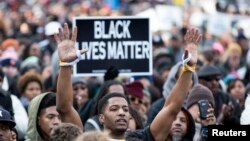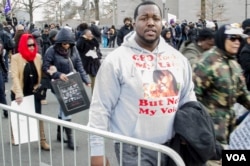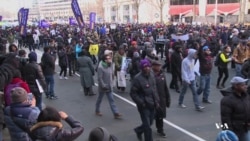During nationwide marches protesting the killings of unarmed black men by white police officers, families of the victims urged demonstrators to continue pressing for changes to the criminal justice system.
In Washington, relatives of Michael Brown, Eric Garner, Tamir Rice and Trayvon Martin gathered on Saturday at Freedom Plaza, near the White House, before peacefully participating with thousands of others in the "Justice for All" march down Pennsylvania Avenue to the Capitol.
"I am here not only for marching for Eric Garner, but for everyone's daughters and sons and nieces and nephews and dads and moms," said Esaw Garner, his widow.
Eric Garner died last July after he was put in a chokehold by police officers in Staten Island, New York, for allegedly selling untaxed cigarettes.
Other families
Joining the Garners in Washington were speakers from the family of Tamir Rice, a 12-year-old killed in Ohio as he played with a pellet gun in a park, and the mother of Amadou Diallo, who in 1999 was shot and killed in the Bronx by four New York City police officers.
Diallo's mother, Kadiatou Diallo, reflected on how the same issues being debated today were debated when her son was killed more than 15 years ago.
"We've been there so many times," she said. "Today we are standing still and demanding the same thing."
The Rev. Al Sharpton’s National Action Network organized the Washington rally, which was part of a planned National Day of Resistance on Saturday conducted by the group Ferguson Action. Organizers said at least 25,000 people had attended the event. Washington police do not release crowd estimates.
Marchers in Washington included many parents with children, and protesters chanted "No justice, no peace, no racist police" and "Hands up, don't shoot." Protesters carried signs that said "All men are created equal" and "Black lives matter."
Organizers said the marches, with tens of thousands rallying in cities including Manhattan, San Francisco, Chicago, Oakland and Washington, D.C., were among the largest held recently against the deaths.
Protests have been held nationwide since last month when a grand jury decided not to charge the white police officer who shot and killed the 18-year-old Brown in the St. Louis suburb of Ferguson, Missouri in August.
While some previous protests have turned violent, Saturday’s protests were peaceful, for the most part, with just a few dozen arrests reported in Oakland and Boston late Saturday.
In Oakland, police detained about 45 people for vandalism, failure to disperse, resisting arrest and other charges on Saturday night after thousands took to the streets. In Boston, about two dozen people were arrested for disorderly conduct after scuffling with officers blocking an Interstate 93 onramp near the Nashua Street Jail.
Cardboard effigies
At the University of California, Berkeley, the scene of on-going protests, life-size cardboard effigies of black lynching victims were seen hanging by nooses Saturday. At least one of the effigies was labeled "I can't breathe," the last words of Garner.
University officials say the three effigies were removed and it is not clear who was responsible for mounting the images.
Meanwhile, Massachusetts Governor Deval Patrick, who was interviewed on CNN’s “State of the Union” news show, said he hopes the focus on the killings leads to "a broader and deeper understanding" among police and civilians.
He said government can do more to train police, but citizens also need to "listen a lot more closely to each other,” The Associated Press reported.
Patrick referred to a mostly peaceful march Saturday in Boston by hundreds of people in which 23 were arrested. He said some didn't seem interested in working with authorities trying to accommodate the protest.
Patrick said beyond disruption, people need to try to bridge a "huge chasm of misunderstanding" that exists around the fears of unarmed black men and police officers.
Some material for this report came from Reuters and AP.







